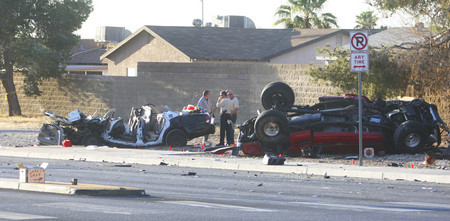Police know driving fast kills

The question to four Metropolitan police officers lingered.
“In what situation should you drive 109 mph,” asked officer Michael Manning, an instructor with the Police Department’s Emergency Vehicle Operation Command, or EVOC.
Maybe, one patrol officer responded, if you’re responding to a call for help from another officer.
Manning cleared the air: It’s never OK to drive that fast.
This is the reason, preached at EVOC to police academy students, senior patrol officers and detectives: “If you don’t arrive, you can’t assist.”
The EVOC instructors were asking the question last week during daylong recertification classes that teach technique and policies for driving a police cruiser.
A month earlier, 28-year-old police officer James Manor died in a crash while responding to a 911 domestic violence call.
Manor, driving 109 miles per hour in a 45 mph zone, struck a pickup that had turned in front of him. He didn’t have his lights and sirens on and he wasn’t wearing a seat belt.
The EVOC instructors are confronting what happened head on.
“His mind and heart were in the right place. He just made poor decisions,” said EVOC Sgt. Lou Maldonado.
The EVOC training every officer goes through is meant to give them the tools to make safe decisions.
Part of that means learning from the mistakes made by others.
EVOC instructors want to dispel any myths about how police are trained to drive.
Lt. Tim Leveque said officers are not trained to speed. They’re trained to know the limits of a police cruiser, what the vehicle is capable of, and how to drive a vehicle smoothly and with finesse. That means smooth steering, smooth braking, and smooth acceleration.
“Smooth equals fast,” Leveque said.
Each officer has a week of intense training at EVOC during the academy.
But after graduation, it will be two years before instructors see officers again for recertification.
There is one policy change that EVOC instructors have presented since Sheriff Doug Gillespie announced a review of emergency response by officers. Officers would go through the recertification program once a year for the first five years of their career.
Currently, patrol officers must be recertified every two years and bureau officers or detectives have to be recertified every three years.
Manor, just shy of his second anniversary at the time of the collision, had not gone through recertification.
Manning said the overwhelming majority of police officer crashes, minor or major, happen within the first five years of being on the job.
To recertify young officers once a year will instill good habits in them and combat the high crash rate, Manning said.
Another major issue is that many officers, like Manor, do not wear seatbelts.
Wearing a seatbelt is not only state law, it’s also Police Department policy.
Driving around the valley, Manning said it’s often a 50-50 shot that he will find police officers in patrol cars not belted in.
I’ve heard of several reasons why officers don’t wear seatbelts. Some feel it’s uncomfortable considering all the gear they wear, or it slows them down if they have to quickly exit their vehicle while responding to a call.
I even learned how some officers avoid the annoying beeping in their squad cars when they don’t engage the seatbelt. Officers can use a seatbelt extender to trick the sensor into believing that the seatbelt is on, or a special code can be punched in via the seatbelt to kill the alarm.
This mind-set baffles EVOC instructors.
Officer Mike Wills, an instructor, said, “Officers will put on a bullet-resistant vest, have a utility belt with a handgun, extra magazines, a baton and say they are safe. Then they get into a car and don’t put on their seatbelts.”
More officers die in on-duty crashes in the United States than are shot to death.
There is no policy change that is needed to correct the problem. The right policy is already in place.
What’s needed is enforcement.
I don’t think there’s any denying that Manor’s intentions were heroic the night he was killed.
But his death will be in vain if his fellow officers don’t heed the lessons it taught.
If you have a question, tip or tirade, call the Road Warrior at 702-387-2904, or e-mail him at roadwarrior@reviewjournal.com. Please include your phone number.
The Nevada Department of Transportation announced the following updates to the Interstate 15 north widening project:D Street at Interstate 15 will be closed through 5 a.m. Monday and from 9 p.m. July 1 through 5 a.m. July 2 for girder placement.
Washington Avenue at Interstate 15 will be closed in each direction through 5 a.m. Wednesday for girder placement.
Bonanza Road at Interstate 15 will be closed from 9 p.m. Friday to 5 a.m. Saturday and from 9 p.m. July 14 to 5 a.m. July 15 for a bridge pour.
Washington Avenue at Interstate 15 will be closed in each direction from 9 p.m. July 8 to 5 a.m. July 9 for a deck pour.
• • •
Motorists should expect lane restrictions on Lorenzi Street, between Alta and Westcliff drives, and on Jones Boulevard, between Evergreen Avenue and Borden Circle, because of an $8.7 million flood control project. Construction also will occur on Alta, between Easy Street and Decatur Boulevard, and on Evergreen, between Easy and Digger streets. The project will take about a year to finish. Lane restrictions and some road closures can also be expected.
LAS VEGAS REVIEW-JOURNAL












